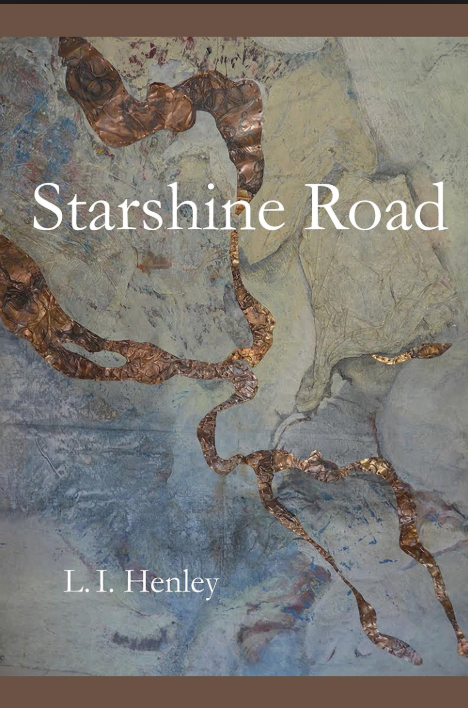ISSN: 1941-4137
POETRY THAT ENACTS THE ARTISTIC AND CREATIVE PURITY OF GLASS
POETRY THAT ENACTS THE ARTISTIC AND CREATIVE PURITY OF GLASS

Travis Cravey is a mechanic in Southeastern Pennsylvania. He is an editor with Malarkey Books, and has been published in Lost Balloon, Soft Cartel, and Fictive Dream. He can be found on Twitter.
April 9, 2019
Edited by Stephanie Kaylor
#TBT Reviews Series
Edited by Stephanie Kaylor
#TBT Reviews Series
Review of Starshine Road by L.I. Henley

Starshine Road
L.I. Henley
Perugia Press, 2017
L.I. Henley’s Starshine Road(Perugia Press, 2017) is an homage to time and place. The collection is a map of sorts, examining dirt roads, abandoned house and abandoned people. The Mojave in these poems never screams, it sits and watches the reader search it out. Popping out its head occasionally, it reminds the reader that the high desert scrapes clean whatever sits still too long.
“Suffer my home with me” Henley petitions. She manages to show the reader the beautiful and the grotesque of this home. The long drives, her mother’s buick, the young man in the health food store, they are all archival features, catalogued for our better understanding of this place. Just as the racist, child abusing Officer Lee in "Cops" and the begging woman of "A Dollar (for a funeral)" also paint the picture, even if in darker hues. As the poet herself tells us in "Shoe Tree", “we judge a thing by what it gives;” we are asked to take these fragments, a mosaic of puzzle pieces, to form a picture.
Henley’s picture is a love song, an airing of grievances, and simple nostalgia. She is obviously not unaware of this tension, as in "Junk Pile as Seen from My Kitchen Table", where the ambiguity is a painful, sad request to “Please/promise me you are something close to content/…so we can keep on this way” There are questions posed that the poet herself admits not having a full throated answer for. “Seeds in a garden do what they want/is it a bad seed because it didn’t please us?” she asks in "Sometimes Three Hawks Sitting on a Fence Post Means What You Want It to Mean in Victorville, California". And the loving portrayal of her mother in several poems (most notably "We Girls and The Road a Silver Ladle") betray her well-earned sentimentality. “Now we could drown for all time/separated together from everybody for all time.”
It isn’t surprising, given this line from "Junk Pile as Seen from inside the Junk Pile"
There is nothing here
that I want
so then how do I
explain my love?
that the author ends the volume with two poems who’s very titles ("When You Are Lost in the Desert Look at What You Can Find" and "Poem for Joshua Tree (9-15-2001)") almost fully flesh out her hopes for the reader. What she shows us in her Mojave home is naked, alive, full of painful regret and casual indiscretion. Henley, it seems, truly wants to paint a true and accurate and complete picture, fully formed and without filters. She accomplishes this several times over, but no better than in collection’s eponymous poem: “Remember the years out here when you thought you were dying/& weren’t even close to an end…”
The Mojave, in the end, forms this collection. It gives it blood and propulsion and meaning. The desert lays bare Henley’s life and dreams, her regrets and humanity. She has managed to open herself up for us, welcoming us into this world, to this high desert love story. She is scraped clean by it, while we are invited to watch.
Visit L.I. Henley's Website
Visit Perugia Press' Website
Glass: A Journal of Poetry is published monthly by Glass Poetry Press.
All contents © the author.
All contents © the author.





